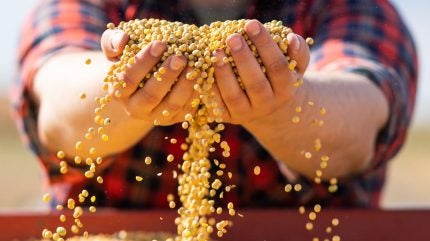
Danone has issued a statement to underline the company still procures soy from Brazil.
Last week, Reuters, quoting Danone CFO Jurgen Esser, said the Activia and Alpro maker had stopped sourcing the commodity from Brazil.
The publication said Danone had switched its purchases to Asia ahead of the EU’s proposed new rules on buying commodities from deforested land. Brussels has put forward a plan to delay the implementation of its EU Deforestation Regulation (EUDR) by a year.
In response, Brazil’s government yesterday (30 October) issued a lengthy statement defending its response to “illegal” deforestation and its “due diligence” over soybean exports. It also criticised the EUDR plans, labelling the rules “arbitrary, unilateral and punitive”.
“Brazil is ready to collaborate but demands to be treated with the same fairness and balance that guide international trade relations. Unreasonable and inappropriate measures – such as the ones announced by European companies with strong presence and activity in the Brazilian market – must be rejected,” the statement from the country’s Ministry of Agriculture and Livestock read.
Danone published its own statement online in reaction to the ministry’s comments.
The French dairy giant said it “regrets” what it called the “incorrect information circulating about Danone and the sourcing of Brazilian soy”.
Danone added: “We confirm that Danone continues to purchase Brazilian soy, in compliance with local and international regulations.
“Brazilian soy is an important input in the company’s feed supply chain for dairy farmers in Brazil and continues to be used.”
The cultivation of soy for the agri-food industry has long proved controversial amid NGO concerns the trade in the commodity can contribute to deforestation, including in the Amazon.
Brazil’s Ministry of Agriculture and Livestock insists the country “has one of the world’s most rigorous environmental legal frameworks”.
In its statement, the ministry said its monitoring and inspection “has enabled the country to combat illegal deforestation with public policies that encompass the Cerrado, the Amazon, and other sensitive regions, ensuring agricultural production is conducted responsibly and sustainably”.
Brazilian exporters “conform to rigorous due diligence processes that ensure the fulfillment of their international clients’ exigencies”, the ministry added. “These processes reflect the efforts and investments in sustainability done by Brazil’s productive sector, with robust and internationally recognized traceability models.”
For its part, Danone said the “majority” of Brazilian soy it sources is “made accessible to dairy farmers through Danone’s Central Purchasing, including processes that secure its origin from non-deforested areas”.
It added: “We wholeheartedly recognise the Brazilian government’s solid commitment to preserving local forests and their remarkable programmes dedicated to protecting the rainforest and advancing sustainable soy agriculture.”
Just Drinks has approached Danone to confirm which parts of its global operations use soy sourced from Brazil.
In the company’s statement, it said: “In other regions, like in the EU, where dairy farmers obtain their feed directly from suppliers of their choice, Brazilian soy is an important input for the industry.
“Danone works actively with the dairy farmers, to ensure that the soy is sourced from sustainable and verified deforestation-free sources, regardless of geographical origin. We also actively encourage the dairy farmers to purchase feed only from traders who respect their commitments or hold credible certifications.”
Posting on LinkedIn earlier this week in the wake of the Reuters story, Gert van der Bijl, senior EU policy advisor at civil-society group Solidaridad Network, wrote: “Quite a bit of media attention for Danone no longer sourcing soy from Brazil. Brazilian soy to be replaced by soy from Asia. With EUDR mentioned as [an] important reason and presented as major change.
“I don’t think it is. Danone uses 260,000 tonnes of soymeal as feed in its dairy supply chain and 50,000 soybeans for soy milk. The soy that Danone sources directly is for the soy milk only. And most of it not coming from Brazil, but from Europe, Canada and China anyway. The soy for feed is not sourced by Danone. Danone buys the milk from dairy farmers. Will they really stop sourcing milk if farmers use feed with Brazilian soy? Can’t imagine.”



